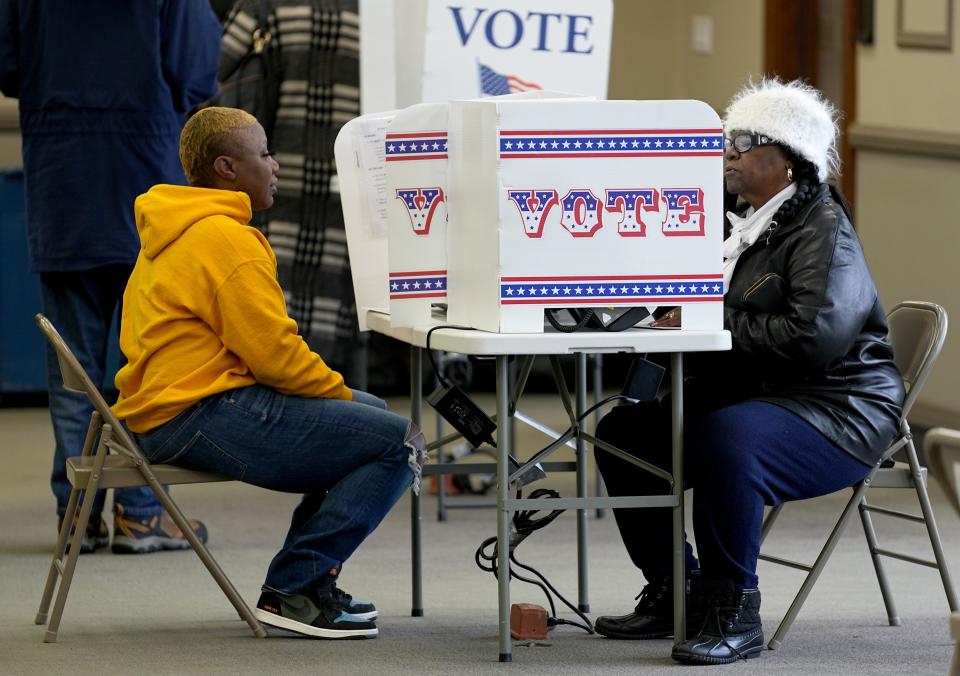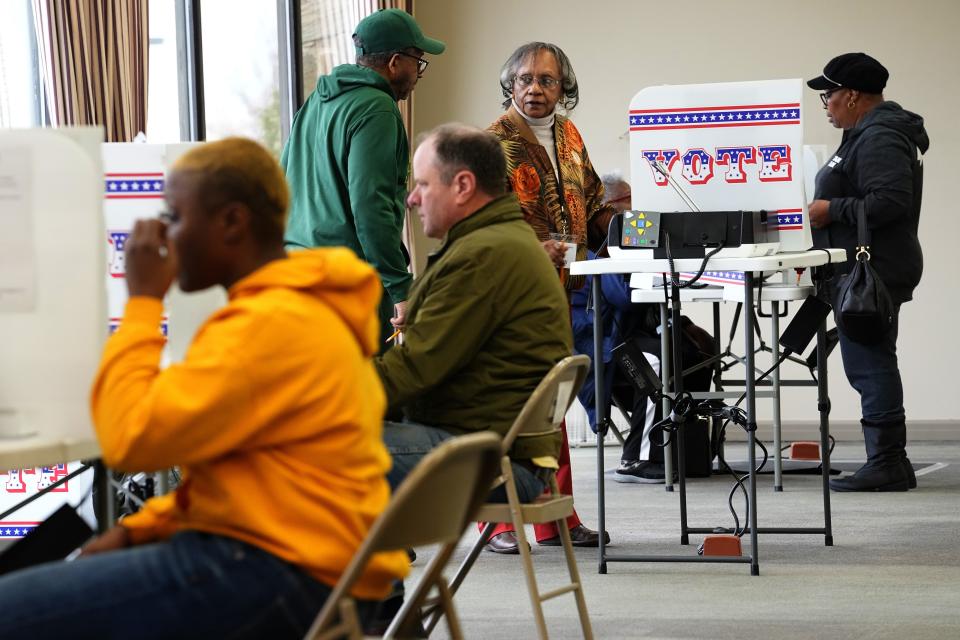Voters will face two referendum questions regarding outside funding of election administration. How to understand these questions
MADISON — Wisconsin voters will see two referendum questions related to election administration on their April 2 ballots — and in the days leading up to the election, they may also see messaging seeking to steer their vote.
Republicans and conservative groups are encouraging voters to support the measures with a "yes" vote, while Democrats and liberal groups are advocating for "no." The two questions, which all Wisconsin voters will see on their ballots, are written as follows:
QUESTION 1: "Use of private funds in election administration. Shall section 7 (1) of article III of the constitution be created to provide that private donations and grants may not be applied for, accepted, expended, or used in connection with the conduct of any primary, election, or referendum?"
QUESTION 2: "Election officials. Shall section 7 (2) of article III of the constitution be created to provide that only election officials designated by law may perform tasks in the conduct of primaries, elections, and referendums?"
Voting "yes" on the first question means private grants and donations would be banned in election administration going forward, while a "no" vote would continue to allow them. A "yes" vote on the second question would add to the state Constitution that only election officials can perform tasks, while a "no" vote would not add that.
The proposals are rooted in Republicans' longstanding scrutiny of millions of dollars in private grants, which they often call "Zuckerbucks." The bulk of the money provided by the Center for Tech and Civic Life, which at the time received funding from Facebook founder Mark Zuckerberg and his wife, went to the state's five largest cities to help them run elections during the COVID-19 pandemic.
Clerks who received grants during the 2020 election said it helped them meet the unexpected costs of the COVID-19 pandemic, such as extra supplies to meet an influx of absentee voting, and have said accepting grants due to inadequate state, federal or local funding would not jeopardize their ability to administer elections fairly.
More: Wisconsin's April 2 referendum questions and the 'Zuckerbucks' debate, explained
Here's a look at the messaging surrounding the referendum.

Conservatives encourage 'yes' votes
Republicans and conservative groups have supported voting "yes" on the questions based on concerns that outside groups could influence how elections are run. In one case, the Republican Party of Wisconsin brought in an Ohio congressman to make that point.
"Secure elections require proper election administration. That's why I'm encouraging everyone in Wisconsin to vote 'yes' on constitutional amendments 1 and 2," U.S. Rep. Jim Jordan said in a video Wednesday. He appeared alongside U.S. Rep. Bryan Steil, who represents southeastern Wisconsin.
Republican former President Donald Trump's campaign is also backing the proposals with social media posts urging Wisconsin voters to "ban Zuckerbucks."
One conservative group is taking a slightly different tack. MacIver Impact, Inc. — the newly-created 501(c)4 arm of the John K. MacIver Institute for Public Policy — launched a digital advertising campaign in support of the ballot measures earlier this month. Although MacIver itself is a conservative organization, several ads prompt voters to "stop the NRA from buying elections" and "stop right-wing billionaires like Elon Musk from buying elections." Others, however, urge Wisconsinites to "keep Obama & Soros out of Wisconsin elections" and "ban Zuckerbucks." The ads are running on Facebook and Instagram.
"What happened during the 2020 election should never be allowed to happen again in Wisconsin. That means permanently ending organizations with outside interests from having a role in the administration of our elections,” said MacIver Impact CEO Annette Olson in a statement. “These common sense amendments would ban dark money from playing a role in administering elections, and MacIver Impact is proud to lead statewide efforts to encourage citizens to vote ‘yes.'"
Liberals advocate against proposals
Democrats and liberal groups have pushed for a "no" vote, arguing the proposed amendments are confusing and could impede the administration of elections barring the allocation of additional state funding.
An analysis from the Legislature's nonpartisan attorneys said the impact of adding the language to the state Constitution is unclear. State law already says that only appointed election officials can conduct elections, but doesn't say what activities count as conducting an election. The referendum doesn't specify that, either.
The Democratic Party of Wisconsin weighed in on the amendments on March 19, endorsing a "no" vote on both questions. In a statement, party chairman Ben Wikler said Republicans were pushing the amendment to "satisfy Donald Trump."
Other liberal-leaning groups have also encouraged voters to reject the questions. The American Civil Liberties Union of Wisconsin said the language is too vague and could prevent clerks from using non-public locations or equipment for polls, such as a church or chairs and tables owned by the church. The League of Women Voters of Wisconsin also opposes the measures, arguing local clerks don't receive sufficient funding from the state and federal governments.
The Wisconsin Democracy Campaign has also supported voting "no" and told voters not to get "duped." The group noted Republicans are putting forward the constitutional amendments — which do not need Democratic Gov. Tony Evers' approval — during a primary election with typically lower turnout.

Wisconsin voters generally vote in favor of referendum questions
While political and advocacy groups are messaging on the initiatives, Rob Yablon, University of Wisconsin Law School professor and co-director of the State Democracy Research Initiative, said there doesn't appear to be a significant organized effort on either side of the issue.
"I am not aware of any huge expenditures of funds on either side," Yablon said. "That's not atypical, compared to other recent proposed amendments in Wisconsin — if you look back at the ones that we've had in recent years, most of them have been a little bit below the radar."
Wisconsin voters typically approve referendums. Out of the 200 times lawmakers have proposed changes to the state Constitution since 1854, voters have only rejected the changes about 50 times, according to the nonpartisan Legislative Reference Bureau.
Since 2000, nine of 10 proposed constitutional amendments have succeeded — the exception being an effort to eliminate the state treasurer's office.
The most recent constitutional amendments approved by Wisconsin voters include two questions last year that expanded the criteria for setting cash bail. Another amendment approved in 2020, often called Marsy's Law, brought a flood of television, radio and social media ads.
That high success rate is likely attributable in part to the fact that the Legislature has broad authority to select the wording of ballot initiatives, as well as when they appear on the ballot, Yablon said.
The questions on the April 2 ballot are two of five scheduled to go before voters this year. That's the most Wisconsin voters have seen in one year since 1982, Yablon said.
"It seems to be a function in part of divided government," he said, noting that Evers had previously vetoed legislative efforts to accomplish the same results.
"There does seem to be a little bit of a trend on the part of the Legislature to seek change through constitutional amendments, maybe in part because they can't get it through legislation right now."
More: Wisconsin statewide election results
More: Local election results
This article originally appeared on Milwaukee Journal Sentinel: Voters to face two referendum questions about election administration
